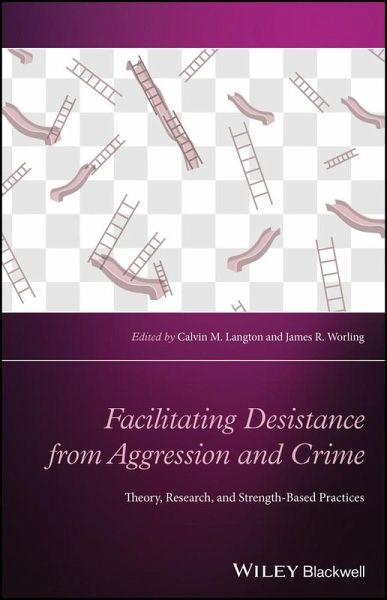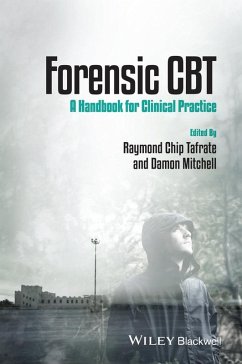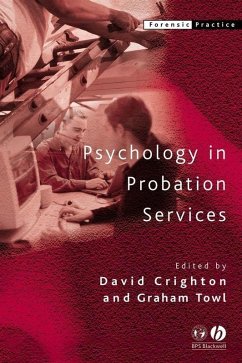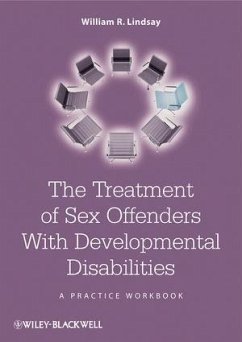eBook, PDF
Facilitating Desistance from Aggression and Crime (eBook, PDF)
Theory, Research, and Strength-Based Practices
Redaktion: Langton, Calvin M.; Worling, James R.

PAYBACK Punkte
0 °P sammeln!






Theory, Research, and Evidence-Based Practice
Dieser Download kann aus rechtlichen Gründen nur mit Rechnungsadresse in D ausgeliefert werden.
Calvin M. Langton, Ph.D., is an Associate Professor in the Department of Psychology, University of Windsor, Ontario, Canada. He is also a clinical and forensic psychologist registered in Ontario, Canada, and a chartered psychologist in the United Kingdom. James R. Worling, Ph.D., is a clinical and forensic psychologist in full-time private practice in Toronto, Canada. He has over 34 years experience working with adolescents who have offended sexually.
Produktdetails
- Verlag: Capstone
- Erscheinungstermin: 28. Juni 2022
- Englisch
- ISBN-13: 9781119166498
- Artikelnr.: 64262500
"Desistance from crime is among the most pressing criminological issues for criminal justice practitioners and policymakers, but strangely is under the radar of many scholars. Until now. In their superlative edited volume, Calvin Langton and James Worling assembled an international team of experts who present timely information on conceptual, aggression, conduct problems, delinquency, sexual offending, and violent crime. Interdisciplinary, engaging, and balanced in its approach, The Wiley Handbook of Facilitating Desistance from Aggression and Crime: Theory, Research, and Strength-Based Practice is an indispensable resource for practitioners and academicians."
--Matt DeLisi, Distinguished Professor and Dean's Professor, Iowa State
--Matt DeLisi, Distinguished Professor and Dean's Professor, Iowa State
Mehr anzeigen
University
"Facilitating Desistance is an excellent book that should be read by all researchers, practitioners, and policymakers who are interested in learning about explanations of desistance and methods of encouraging desistance. It is wide-ranging and well-researched, focusing especially (and commendably) on strength-based and protective factors. It includes extensive reviews of explanation and prediction as well as assessment and treatment methods for different types of offenders, including sex offenders and mentally disordered offenders."
--David P Farrington Emeritus Professor of Psychological Criminology, Cambridge University
"Facilitating Desistance from Aggression and Crime is the authoritative guide on all matters related to desistance. An impressive array of international experts skillfully synthesize and critique a range of theoretical, assessment, and treatment issues germane to desistance and strength-based paradigms. Operating through an evidence-based lens, Facilitating Desistance from Aggression and Crime spans a multitude of settings and diverse populations. Students, practitioners, and seasoned scholars alike will benefit immensely from this book."
--Shelley Brown, Ph.D. Associate Professor, Department of Psychology, Carleton University
"This is a landmark book that sets out to integrate desistance theory and research with strength based approaches in correctional and forensic practice. The authors are experts in their chapter topics and do a beautiful job of retaining the best aspects of risk oriented practice with a greater focus on individuals with core values and aspirations. The scholarship is impeccable, the writing uniformly strong and the proposals for the future of our field novel and exciting. This book provides a comprehensive roadmap for the future."
--Tony Ward, Professor, Victoria University of Wellington
"With backgrounds ranging from social work to forensic psychiatry, the contributors to this remarkable volume bring desistance theory to the world of practice in a way no previous book has been able to achieve. A Fantastic contribution to research-informed practice that should be widely read."
--Shadd Maruna, Professor of Criminology, Queen's University Belfast
"Facilitating Desistance from Aggression and Crime provides a full range of coverage for professionals interested in helping justice-involved clients reduce harmful behaviors and develop paths to meaningful lives. The contributors are many of the world's leading experts on topics ranging from desistance models, assessment of protective factors, and strength-based approaches to treatment. A must read for anyone interested in alternatives to the cycle of recidivism prevalent in today's criminal justice system."
--Raymond Chip Tafrate, PhD, Professor and Clinical Psychologist, Department of Criminology and Criminal Justice, Central Connecticut State University, Co-Author, CBT with Justice-Involved Clients: Interventions for Antisocial and Self-Destructive Behaviors and Co-Editor, Forensic CBT: A Handbook for Clinical Practice
"'Desistance' and 'strength-based approaches' have become catchcries in criminal justice- but with little meaning or substance. Facilitating Desistance from Aggression and Crime promises to help catapult the field forward in an impactful way. The impressive array of authors systematically tackle the theory, research, and applications that add to our understanding of how people 'stop crime'- and how our practices and systems can support that. This volume should be mandatory reading for those who work with people who come into the criminal justice system, and those at risk for doing so."
--James R. P. Ogloff AM, Dean, School of Health Sciences, Swinburne University of Technology, Executive Director of Psychological Services and Research, Victorian Institute of Forensic Mental Health
"I am delighted to write a review for this edited volume, as this is a very timely addition to the work that is now beginning to focus on more 'positive' approaches in treating those who have committed various crimes. The editors have gathered some of the foremost thinkers in the current field relating to desistance, assessing strengths in individuals who have committed anitsocial acts, and promoting protective factors in treatment. Hence this volume provides an excellent overview of the current situation in the field; as well as proving insights and pointers into where the desistance field is heading. As such it is an invaluable addition to treatment literature, and is a must buy for those working, or have an interest, in crime prevention."
--Anthony Beech, Professor (Emeritus) University of Birmingham
"Don't talk to me about better outcomes if the derisive 'us vs them' dualism is present. Yes, pain and problems may start the process of change, yet these troubling conditions will never finish the job. By assembling exemplars in the Strengths Approach, Langston & Worling detail new, humanizing pathways for 'finishing the job'. You want to help the helpers? A much-needed continuation of the Strengths approach lies before you. May it find its way to classrooms and desktops across the globe."
--Michael D. Clark, MSW, Director Center for Strength-Based Strategies, Mason, Michigan
"This is a refreshing contribution to the understanding and application of practical ideas to inform the question: 'How do we support people who offend to desist from re-engaging in previous behaviour.' We all know that behaviour change is fundamentally challenging as is its maintenance. Supporting those who offend to build psychological flexibility, general self-efficacy, optimism and hope, invite a focus of what is 'in play', rather than being 'risk obsessed'. Building narratives of desistance to patterns of behaviour include builidng intrinsic motivation, ensuring people have the skills to live a different life (response- ability), and nesting these in supportive conditions, are fundamental aspects of effective intervention. Although this book focusses upon desistance related to offending behaviour, its reach is much greater. The concepts are very applicable to other areas of behaviour change (health, lifestyle, addictions, education, etc.)."
--Ken McMaster, Principal Trainer, Hall McMaster & Associates Limited
"Facilitating Desistance is an excellent book that should be read by all researchers, practitioners, and policymakers who are interested in learning about explanations of desistance and methods of encouraging desistance. It is wide-ranging and well-researched, focusing especially (and commendably) on strength-based and protective factors. It includes extensive reviews of explanation and prediction as well as assessment and treatment methods for different types of offenders, including sex offenders and mentally disordered offenders."
--David P Farrington Emeritus Professor of Psychological Criminology, Cambridge University
"Facilitating Desistance from Aggression and Crime is the authoritative guide on all matters related to desistance. An impressive array of international experts skillfully synthesize and critique a range of theoretical, assessment, and treatment issues germane to desistance and strength-based paradigms. Operating through an evidence-based lens, Facilitating Desistance from Aggression and Crime spans a multitude of settings and diverse populations. Students, practitioners, and seasoned scholars alike will benefit immensely from this book."
--Shelley Brown, Ph.D. Associate Professor, Department of Psychology, Carleton University
"This is a landmark book that sets out to integrate desistance theory and research with strength based approaches in correctional and forensic practice. The authors are experts in their chapter topics and do a beautiful job of retaining the best aspects of risk oriented practice with a greater focus on individuals with core values and aspirations. The scholarship is impeccable, the writing uniformly strong and the proposals for the future of our field novel and exciting. This book provides a comprehensive roadmap for the future."
--Tony Ward, Professor, Victoria University of Wellington
"With backgrounds ranging from social work to forensic psychiatry, the contributors to this remarkable volume bring desistance theory to the world of practice in a way no previous book has been able to achieve. A Fantastic contribution to research-informed practice that should be widely read."
--Shadd Maruna, Professor of Criminology, Queen's University Belfast
"Facilitating Desistance from Aggression and Crime provides a full range of coverage for professionals interested in helping justice-involved clients reduce harmful behaviors and develop paths to meaningful lives. The contributors are many of the world's leading experts on topics ranging from desistance models, assessment of protective factors, and strength-based approaches to treatment. A must read for anyone interested in alternatives to the cycle of recidivism prevalent in today's criminal justice system."
--Raymond Chip Tafrate, PhD, Professor and Clinical Psychologist, Department of Criminology and Criminal Justice, Central Connecticut State University, Co-Author, CBT with Justice-Involved Clients: Interventions for Antisocial and Self-Destructive Behaviors and Co-Editor, Forensic CBT: A Handbook for Clinical Practice
"'Desistance' and 'strength-based approaches' have become catchcries in criminal justice- but with little meaning or substance. Facilitating Desistance from Aggression and Crime promises to help catapult the field forward in an impactful way. The impressive array of authors systematically tackle the theory, research, and applications that add to our understanding of how people 'stop crime'- and how our practices and systems can support that. This volume should be mandatory reading for those who work with people who come into the criminal justice system, and those at risk for doing so."
--James R. P. Ogloff AM, Dean, School of Health Sciences, Swinburne University of Technology, Executive Director of Psychological Services and Research, Victorian Institute of Forensic Mental Health
"I am delighted to write a review for this edited volume, as this is a very timely addition to the work that is now beginning to focus on more 'positive' approaches in treating those who have committed various crimes. The editors have gathered some of the foremost thinkers in the current field relating to desistance, assessing strengths in individuals who have committed anitsocial acts, and promoting protective factors in treatment. Hence this volume provides an excellent overview of the current situation in the field; as well as proving insights and pointers into where the desistance field is heading. As such it is an invaluable addition to treatment literature, and is a must buy for those working, or have an interest, in crime prevention."
--Anthony Beech, Professor (Emeritus) University of Birmingham
"Don't talk to me about better outcomes if the derisive 'us vs them' dualism is present. Yes, pain and problems may start the process of change, yet these troubling conditions will never finish the job. By assembling exemplars in the Strengths Approach, Langston & Worling detail new, humanizing pathways for 'finishing the job'. You want to help the helpers? A much-needed continuation of the Strengths approach lies before you. May it find its way to classrooms and desktops across the globe."
--Michael D. Clark, MSW, Director Center for Strength-Based Strategies, Mason, Michigan
"This is a refreshing contribution to the understanding and application of practical ideas to inform the question: 'How do we support people who offend to desist from re-engaging in previous behaviour.' We all know that behaviour change is fundamentally challenging as is its maintenance. Supporting those who offend to build psychological flexibility, general self-efficacy, optimism and hope, invite a focus of what is 'in play', rather than being 'risk obsessed'. Building narratives of desistance to patterns of behaviour include builidng intrinsic motivation, ensuring people have the skills to live a different life (response- ability), and nesting these in supportive conditions, are fundamental aspects of effective intervention. Although this book focusses upon desistance related to offending behaviour, its reach is much greater. The concepts are very applicable to other areas of behaviour change (health, lifestyle, addictions, education, etc.)."
--Ken McMaster, Principal Trainer, Hall McMaster & Associates Limited
Schließen
Für dieses Produkt wurde noch keine Bewertung abgegeben. Wir würden uns sehr freuen, wenn du die erste Bewertung schreibst!
Eine Bewertung schreiben
Eine Bewertung schreiben
Andere Kunden interessierten sich für













